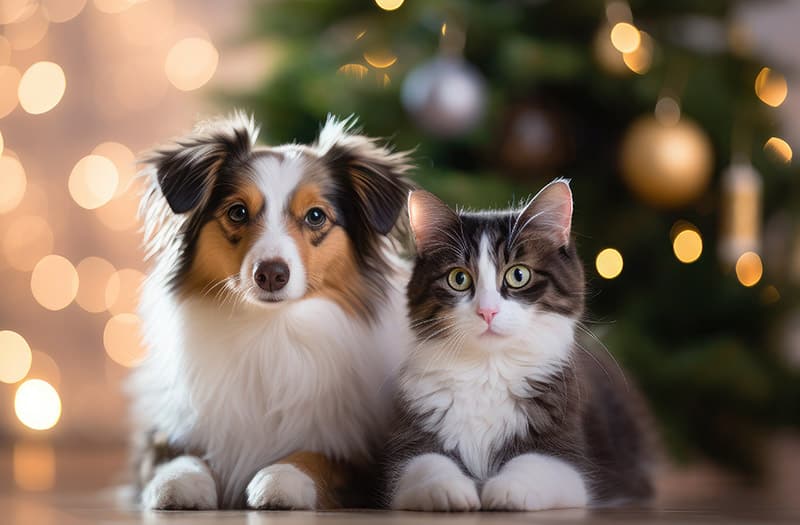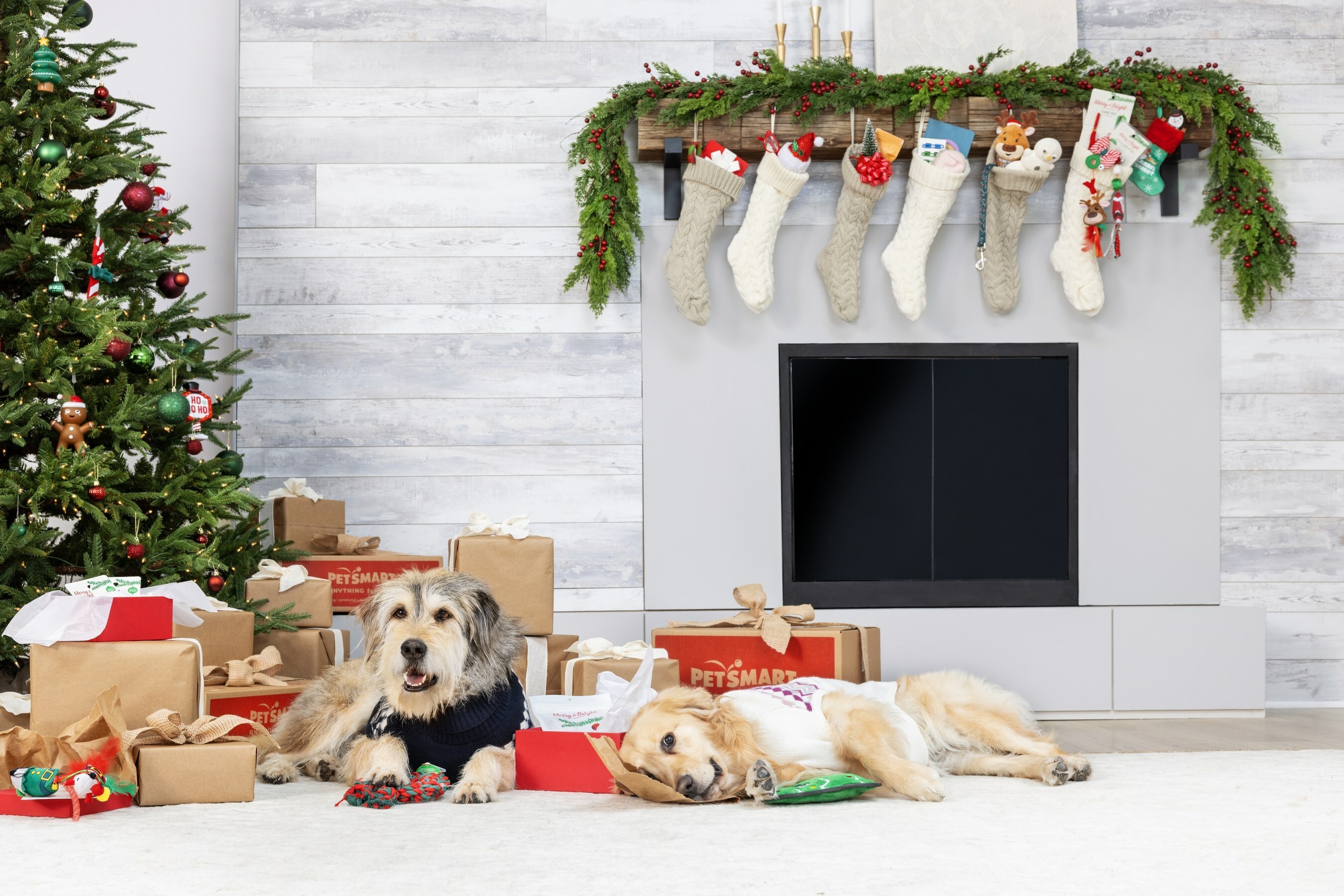Avoid a Christmas Catastrophe: Protect Your Pets from Poisonous Plant Perils

The most wonderful time of the year is filled with cheerful plants and flowers. However, some classic festive flora can pose serious health hazards to pets.
As you deck your halls this season, keep your furry family members safe from a decor disaster caused by plants that are poisonous to dogs and cats. You and your pet will enjoy the holidays at home far more than at the Veterinary Hospital Emergency Room.
Besides saving yourself from additional holiday chaos with a bit of caution, you can save yourself significant money, too. Nationwide® pet insurance recently analyzed its database of more than 1.2 million insured pets and released results showing that the average cost for a plant poisoning claim ran $610 and claims for ingestion of foreign objects averaged $2,400.
Lovely but Lethal Lilies
Lilies look striking in holiday centerpieces, but they can harm curious cats grievously. Even tiny tastes pack a dangerous punch.
- All parts: pollen, blossoms, stems, and leaves are extremely toxic to cats
- Even the water lilies are kept in is highly toxic
- Small ingestions can cause big symptoms
- Lilies contain nephrotoxins and glycoalkaloids that can cause acute kidney failure
- Progressive kidney damage and death are possible for cats without swift vet treatment
The risk to felines created by the toxins in Lilies is very high. Exercise extreme caution with your cat and this deadly plant.
Jolly but Risky Holly
Evergreen boughs studded with bright berries spread good cheer. But a nibble of holly leaves or berries does anything but.
- Berries contain toxic saponins and alkaloids
- Can cause significant digestive upset
- Prickly leaves pose risks of choking and intestinal blockage
Fatal Flower: Deadly Amaryllis
With their crimson petals and evergreen leaves, amaryllis screams “Christmas.” Too bad they also silently scream “poison!” to pets.
- Bulbs and leaves are the most toxic
- Can cause abdominal distress, depression
- In some cases, seizures and tremors
- Keep cut flowers and irresistible bulbs away from pets
Mistletoe Mayhem
This iconic holiday plant promises kisses but also delivers worrying toxicity — keep your mistletoe hanging high where you can stand under it to catch a kiss, and it will stay out of your precious pet’s tummy!
- Berries harbor harmful lectins and alkaloids
- Can irritate digestion and spike heart rate and blood pressure
- May cause tremors or seizures in some cases
Hazardous Holiday Tress
Evergreen aromas evoke holiday coziness. But pine needle nibbles net nothing but woe.
- Needles can irritate the digestion tract
- Contains risky terpenes and tannins
- Can cause vomiting, lethargy, even skin irritation
Also, be cautious to prevent pets from drinking the water in the tree bowl. That seemingly innocent water can be tainted with bacteria, mold, residual pesticides, and preservative chemicals. Keep plenty of fresh, clean water available to your pets so they won’t be tempted to lap up the yuck.
Lethal Emerald Beauty: Yew
With fanned sprays of green leaves and red berries, yew is a popular evergreen adornment. But with tradition comes toxicity.
- Leaves and seeds harbor dangerous taxines and cyanogenic glycosides
- Can cause digestive, respiratory, or neurologic illness
- Potentially fatal without swift treatment
Red Beauty Outside, Poison Within: Poinsettias
Poinsettias are the flower of Christmas with their rich crimson holiday splendor. But even these symbols of the season can’t escape packing a hidden toxic punch.
- Milky sap contains irritant organic diterpenes
- Can trigger digestive upset and skin irritation
- Toxicity is overstated, but caution is still warranted
Somewhere along the way, the Poinsettia got a bum rap. While eating poinsettias can upset your pet’s stomach and cause mouth irritation, the quintessential Christmas plant is far from deadly.
Faux Flowers, Real Risks
Don’t be fooled into thinking that your dog or cat is safe around artificial plants. Materials like plastic, fabric, wire, and dyes used to manufacture fake flora can contain harmful chemicals. Worse yet, these undigestible materials can easily lead to internal issues that require a costly trip to the vet emergency hospital.
Make Pet-Proofing a Holiday Tradition
“The majority of holiday-related health hazards are preventable, which is great news, but it does mean taking some extra steps to ensure that everyone in the family can safely enjoy traditions,” says Dr. Jules Benson, Vice President, Pet Health and Chief Veterinary Officer at pet insurer Nationwide.
“When it comes to preventing holiday health emergencies, it’s important to consider your pet’s personality. Our data shows that certain breeds and younger pets are at a higher risk for things like foreign body ingestion. Pet parents should also take time to see their house from their pet’s perspective and pet-proof accordingly.”
If Dangerous Plant Ingestion Occurs
Immediately secure the plant so your pet doesn’t keep eating more.
Don’t throw away the plant until it has been identified and your pet has received veterinary care.
Contact the Pet Poison Helpline at (855) 764-7661 or the ASPCA Animal Poison Control Center at (888) 426-4435, where you can get immediate help from trained veterinary toxicology professionals. They will help you determine how concerned you should be about exposure to the toxic plant and what to do next.
Try to identify the plant (via purchase receipt, pot labeling, or by an image search ), as many plants have similar names. This can help when speaking to poison hotline personnel or your veterinarian to determine the next steps.
If your pet has difficulty breathing, trouble standing or walking, loses alertness, or experiences tremors or seizures, seek immediate care from a veterinarian.
Have a Holly Jolly and Hazard-Free Holiday!
By exercising caution when decking the halls, we can make this season jolly and safe for our furry friends. Protect precious cats and dogs by keeping the potentially toxic tidings of holiday plants out of curious paws’ reach!




Responses